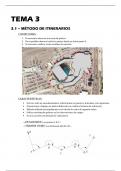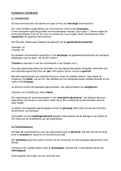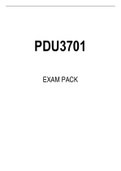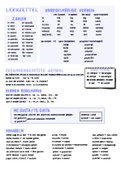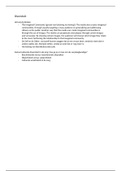EDMHODR
EXAM PACK
2023
QUESTIONS WITH ANSWERS
EMAIL:
,1. Grave ’s meaningful learning and rote learning
Rote Learning
⦁ It involves the acquisi on of single somewhat contrived concepts.
⦁ It involves the solu on of ar ficial problems and learning of arbitrary associa ons.
⦁ The effect is usually short term.
⦁ It is the verba m memoriza on of new informa on and has no connec on between new and
previous knowledge.
⦁ Presents defini ons, formulas, and new informa on without explaining rela onship with
students’ experiences
⦁ It is a random presenta on of new knowledge into the memory with no effort to integrate new
knowledge with prior knowledge
⦁ Remembering phone numbers and dates, and names are examples of rote learning.
⦁ Repea ng this type of material helps a learner recall it exactly as it was presented.
⦁ As a mediator of learning you should realize that rote learning implies that the learner did not
construct his own knowledge and a ach his own meaning to the content.
⦁ We've all tried repe on as a learning technique. The idea is that the more mes we are exposed
to material the deeper it will sink in. It’s a powerful technique when applied to appropriate
material.
⦁ Repe on works for rote learning but is less useful when trying to learn meaningful material.
MeaningfulLearning
⦁ It involves the acquisi on of the complex network of interrelated ideas characteris c of an
organized body of knowledge that learners must incorporate in their cognive structure.
⦁ It relates informa on to everyday experiences.
⦁ New informa on is related to what students already know (prior knowledge) and is generally
more powerful and interes ng.
⦁ Meaningful learning achieves both reten on and transfer,and even achieves reten on be er
than rote learning.
⦁ It is a deliberate effort to link new knowledge with prior knowledge.
, ⦁ Learning has a long term effect
⦁ To achieve Meaningful Learning you must organize instruc on to make meaningful connec ons to
what learners already know.
⦁ Meaningful learning on the other hand is ed and related and integrated to previous learning.
⦁ Although meaningful learning includes memoriza on and is in fact a very important part,
learning should not be equated with mere memoriza on.
⦁ When meaningful learning occurs the facts are stored in a rela onal manner. That is, the brain
stores them together because they are related to each other.
⦁ This strengthening process increases the new material's dis nctness; it prevents the material
from becoming absorbed by what was previously known.
⦁ This dis nctness will make the material retrievable and applicable to new circumstances.
Learning implies change:
⦁ We can conclude that learning is a change in performance through condi ons of ac vity, prac ce
and experience.
⦁ It refers to changes in the individual’s habits, insights, a tude, preferences and skill which leads
to increased knowledge or the ability to do something which that individual had previously not
been able to do.
Underlying assump ons:
⦁ The behavioris c view of learning was the greatest influence on educa on and con nues to
influence educa on as is evident from the role that drill and prac ce, rewards, reinforcement and
the breaking of nega ve behaviors in the classroom plays.
⦁ Behaviorists believe that human behavior is orderly, predictable and controllable.
⦁ Learners are ac ve par cipants in the construc on of their own knowledge.
⦁ The construc on of meaning and knowledge is the result of the interac on between the
informa on that is being presented by the educator and the learner’s interpreta on of that
informa on based on his experiences, understandings and prior knowledge.
The following summary is useful:
⦁ People learn what is personally meaningful to them.
⦁ People learn more when they accept challenging but achievable goals
⦁ Learning is developmental
⦁ Individuals learn differently but in general people construct new knowledge by building on their
current knowledge.
, ⦁ Much learning occurs through social interac on
⦁ People need feedback to learn, but feedback must be accurate
⦁ Successful learning involves the use of strategies
⦁ A posi ve emo onal climate strengthens learning
⦁ Learning is influenced by the total environment – physical, social and psychological.
The role of experience in learning:
⦁ Learning is therefore a process of reflec on on and interpreta on of experience i.e. Our lens
allows us to see what we have not seen before and to see things more clearly than we saw them
before.
⦁ Using the learners experiences in the classroom are:
➢ Link learning contents with previous experiences
➢ Base learning on current experiences
➢ Crea ng new experiences.
Reflec on on experiences:
⦁ The meaning that a person a aches to an experience can never be given or prescribed, it will
depend on that persons own, unique interpreta on.
⦁ This interpreta on is unique because a persons’ unique personal and cultural history influences
the way in which he interprets an event or experience and constructs knowledge from it.
⦁ Memory:
⦁ Without memory learning is impossible and is an individual’s ability to recall informa on or skills
previously learnt.
⦁ The short term memory which is associated with recent or current events, is very limited. It can
accommodate only about 7 informa on units at a me.
⦁ Chunking is a process of organizing informa on in which two or more pieces of the informa on
are combined.
⦁ The long term memory does not have the same limita ons as the STM but the successful recall of
informa on will depend on how effec ve the knowledge was stored.
⦁ Knowledge that is well organized and structured will be easier to understand and remember.
2. Teaching strategies and their rela ve importance to mul cultural
teaching
EXAM PACK
2023
QUESTIONS WITH ANSWERS
EMAIL:
,1. Grave ’s meaningful learning and rote learning
Rote Learning
⦁ It involves the acquisi on of single somewhat contrived concepts.
⦁ It involves the solu on of ar ficial problems and learning of arbitrary associa ons.
⦁ The effect is usually short term.
⦁ It is the verba m memoriza on of new informa on and has no connec on between new and
previous knowledge.
⦁ Presents defini ons, formulas, and new informa on without explaining rela onship with
students’ experiences
⦁ It is a random presenta on of new knowledge into the memory with no effort to integrate new
knowledge with prior knowledge
⦁ Remembering phone numbers and dates, and names are examples of rote learning.
⦁ Repea ng this type of material helps a learner recall it exactly as it was presented.
⦁ As a mediator of learning you should realize that rote learning implies that the learner did not
construct his own knowledge and a ach his own meaning to the content.
⦁ We've all tried repe on as a learning technique. The idea is that the more mes we are exposed
to material the deeper it will sink in. It’s a powerful technique when applied to appropriate
material.
⦁ Repe on works for rote learning but is less useful when trying to learn meaningful material.
MeaningfulLearning
⦁ It involves the acquisi on of the complex network of interrelated ideas characteris c of an
organized body of knowledge that learners must incorporate in their cognive structure.
⦁ It relates informa on to everyday experiences.
⦁ New informa on is related to what students already know (prior knowledge) and is generally
more powerful and interes ng.
⦁ Meaningful learning achieves both reten on and transfer,and even achieves reten on be er
than rote learning.
⦁ It is a deliberate effort to link new knowledge with prior knowledge.
, ⦁ Learning has a long term effect
⦁ To achieve Meaningful Learning you must organize instruc on to make meaningful connec ons to
what learners already know.
⦁ Meaningful learning on the other hand is ed and related and integrated to previous learning.
⦁ Although meaningful learning includes memoriza on and is in fact a very important part,
learning should not be equated with mere memoriza on.
⦁ When meaningful learning occurs the facts are stored in a rela onal manner. That is, the brain
stores them together because they are related to each other.
⦁ This strengthening process increases the new material's dis nctness; it prevents the material
from becoming absorbed by what was previously known.
⦁ This dis nctness will make the material retrievable and applicable to new circumstances.
Learning implies change:
⦁ We can conclude that learning is a change in performance through condi ons of ac vity, prac ce
and experience.
⦁ It refers to changes in the individual’s habits, insights, a tude, preferences and skill which leads
to increased knowledge or the ability to do something which that individual had previously not
been able to do.
Underlying assump ons:
⦁ The behavioris c view of learning was the greatest influence on educa on and con nues to
influence educa on as is evident from the role that drill and prac ce, rewards, reinforcement and
the breaking of nega ve behaviors in the classroom plays.
⦁ Behaviorists believe that human behavior is orderly, predictable and controllable.
⦁ Learners are ac ve par cipants in the construc on of their own knowledge.
⦁ The construc on of meaning and knowledge is the result of the interac on between the
informa on that is being presented by the educator and the learner’s interpreta on of that
informa on based on his experiences, understandings and prior knowledge.
The following summary is useful:
⦁ People learn what is personally meaningful to them.
⦁ People learn more when they accept challenging but achievable goals
⦁ Learning is developmental
⦁ Individuals learn differently but in general people construct new knowledge by building on their
current knowledge.
, ⦁ Much learning occurs through social interac on
⦁ People need feedback to learn, but feedback must be accurate
⦁ Successful learning involves the use of strategies
⦁ A posi ve emo onal climate strengthens learning
⦁ Learning is influenced by the total environment – physical, social and psychological.
The role of experience in learning:
⦁ Learning is therefore a process of reflec on on and interpreta on of experience i.e. Our lens
allows us to see what we have not seen before and to see things more clearly than we saw them
before.
⦁ Using the learners experiences in the classroom are:
➢ Link learning contents with previous experiences
➢ Base learning on current experiences
➢ Crea ng new experiences.
Reflec on on experiences:
⦁ The meaning that a person a aches to an experience can never be given or prescribed, it will
depend on that persons own, unique interpreta on.
⦁ This interpreta on is unique because a persons’ unique personal and cultural history influences
the way in which he interprets an event or experience and constructs knowledge from it.
⦁ Memory:
⦁ Without memory learning is impossible and is an individual’s ability to recall informa on or skills
previously learnt.
⦁ The short term memory which is associated with recent or current events, is very limited. It can
accommodate only about 7 informa on units at a me.
⦁ Chunking is a process of organizing informa on in which two or more pieces of the informa on
are combined.
⦁ The long term memory does not have the same limita ons as the STM but the successful recall of
informa on will depend on how effec ve the knowledge was stored.
⦁ Knowledge that is well organized and structured will be easier to understand and remember.
2. Teaching strategies and their rela ve importance to mul cultural
teaching




